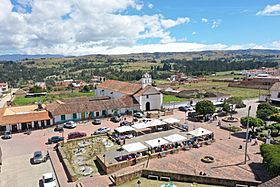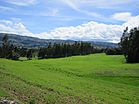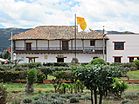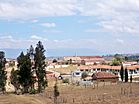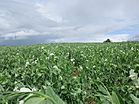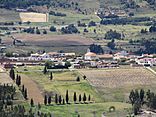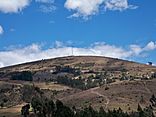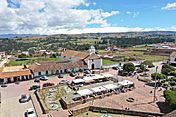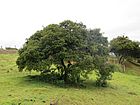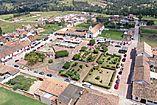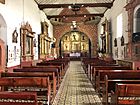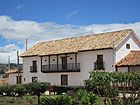Oicatá facts for kids
Quick facts for kids
Oicata
|
|||
|---|---|---|---|
|
Municipality and town
|
|||
|
Oicatá
|
|||
|
|||
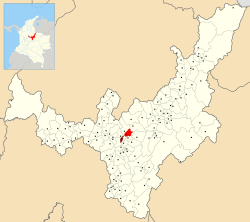
Location of the municipality and town of Oicatá in Boyacá
|
|||
| Country | |||
| Department | Boyacá Department | ||
| Province | Central Boyacá Province | ||
| Founded | 9 May 1539 (487 Years ago) | ||
| Founded by | Pedro Ruiz Corredor | ||
| Area | |||
| • Municipality and town | 59 km2 (23 sq mi) | ||
| Elevation | 2,815 m (9,236 ft) | ||
| Population
(2015)
|
|||
| • Municipality and town | 2,834 | ||
| • Density | 48.0/km2 (124.4/sq mi) | ||
| • Urban | 301 | ||
| Time zone | UTC-5 (Colombia Standard Time) | ||
| Website | Official website: http://www.oicata-boyaca.gov.co/ | ||
Oicatá is a town and municipality in Colombia. It is located in the Boyacá Department, which is part of the Central Boyacá Province. The town center is high up in the mountains, about 2,815 meters (9,236 feet) above sea level.
Oicatá is about 153 kilometers (95 miles) from Bogotá, the capital of Colombia. It is also quite close to Tunja, the capital of the Boyacá Department, only about 15 kilometers (9 miles) away. The town shares its borders with other municipalities like Cómbita, Tuta, and Chivatá.
Contents
What's in a Name?
The name Oicatá comes from the ancient Chibcha language. The Chibcha people lived in this area long ago. The name Oicatá means "Domain of the priests" or "Hailstoned farmlands." This gives us a clue about its history and environment!
A Look Back in Time
Oicatá was officially founded on May 9, 1539. It was established by a person named Pedro Ruiz Corredor.
Before the Spanish arrived, this land was home to the Muisca people. The Muisca were a very advanced group. They had a strong society, rich culture, and productive farms.
When the Spanish took control, a Governor General ruled the area. This leader was chosen directly by the King of Spain.
Gaining Freedom
After many years of Spanish rule, the people fought for their freedom. A very important battle was the Battle of Boyacá. On August 7, 1819, troops led by Simón Bolívar defeated the Spanish forces. This victory helped Colombia become independent.
How Oicatá Was Organized
After gaining independence, Colombia started to organize its land.
- In 1821, the country was divided into departments. These departments were then split into provinces, and provinces into smaller areas. Boyacá became an important administrative area.
- Later, in 1857, Boyacá was set up as a "sovereign state." This meant it had more control over its own affairs.
- Over the years, the way Boyacá was divided changed several times. New departments and regions were created or combined.
- In 1886, a new constitution divided the country into departments, provinces, and municipalities. This system is closer to what we see today.
- In 1911, some changes happened again. Certain areas were separated from Boyacá.
- Eventually, in 1973, the region of Casanare, which had been part of Boyacá, became its own separate department.
What Oicatá Produces
The main way people make a living in Oicatá is through agriculture. Farmers grow many different crops. These include potatoes, maize (corn), barley, wheat, peas, and beans.
Weather in Oicatá
Oicatá's weather is special because of its high location. At almost 3,000 meters (9,800 feet) above sea level, it's one of the higher towns in Colombia.
This means Oicatá has a subtropical highland climate. The temperature doesn't change much throughout the year. However, there is a clear dry season from December to February.
| Weather chart for
|
|||||||||||||||||||||||||||||||||||||||||||||||
|---|---|---|---|---|---|---|---|---|---|---|---|---|---|---|---|---|---|---|---|---|---|---|---|---|---|---|---|---|---|---|---|---|---|---|---|---|---|---|---|---|---|---|---|---|---|---|---|
| J | F | M | A | M | J | J | A | S | O | N | D | ||||||||||||||||||||||||||||||||||||
|
23
19
7
|
30
19
7
|
64
19
8
|
116
18
9
|
108
18
9
|
92
16
8
|
70
16
8
|
69
17
8
|
72
17
8
|
122
17
8
|
108
18
8
|
43
18
7
|
||||||||||||||||||||||||||||||||||||
| temperatures in °C precipitation totals in mm source: Climate-data.org - Tunja |
|||||||||||||||||||||||||||||||||||||||||||||||
|
Imperial conversion
|
|||||||||||||||||||||||||||||||||||||||||||||||
Images for kids
See also
 In Spanish: Oicatá para niños
In Spanish: Oicatá para niños
 | Precious Adams |
 | Lauren Anderson |
 | Janet Collins |


